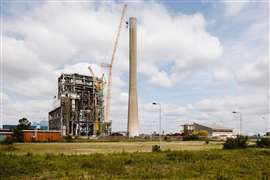Read this article in 中文 Français Deutsch Italiano Português Español
Riyadh Metro opens, will ‘transform’ travel in Saudi Arabia
28 November 2024
Saudi Arabia’s first underground railway project, the Riyadh Metro, has officially opened. It is expected to initially serve 1.2 million daily passengers, with ultimately a planned maximum capacity of 3.6 million passengers daily.
The project was delivered by the BACS consortium, which includes Bechtel, Almabani General Contractors, Consolidated Contractors Company and Siemens.
The consortium was responsible for the design, construction, testing, commissioning and integration of the network’s Blue Line (line 1), which is now operational, and the Red Line (line 2), set to officially commence passenger operations soon.
“The Riyadh Metro will transform travel in Saudi Arabia by offering a more sustainable and efficient mode of transportation for millions of people,” said Darren Mort, President of Bechtel’s Infrastructure business.
“As one of the most complex projects that Bechtel has ever undertaken, I am especially proud of our team for overcoming many technical challenges and completing this project with the utmost skill and ingenuity.”
The 85-station, six-line Riyadh Metro Project is being launched in stages. The Blue Line is one of the first to partially open and will run north to south through Downtown Riyadh. The line will run by several notable stations, including the King Abdullah Financial District Station with its undulating roof, and the STC Olaya Station, located more than 100 feet below ground.
It is estimated that the Riyadh Metro will play a pivotal role in increasing the current public transport share in the city from 2% to 18% by 2030.
Brendan Bechtel, Chairman and CEO of Bechtel, wrote on a blog post that, “Since breaking ground in 2014, the Riyadh Metro has been the world’s largest rail project under construction over the past decade or so – not to mention one of the largest in Bechtel’s history. The job site spanned 800 square kilometers, an area bigger than New York City.
“As Riyadh’s residents begin their journeys on this world-class metro system, they are not just stepping onto trains; they are stepping into a brighter, more connected, and sustainable future.”
Bechtel says that it has worked in Saudi Arabia for more than 80 years, developing megaprojects from oil and gas facilities to airports and critical infrastructure.
STAY CONNECTED


Receive the information you need when you need it through our world-leading magazines, newsletters and daily briefings.
CONNECT WITH THE TEAM











